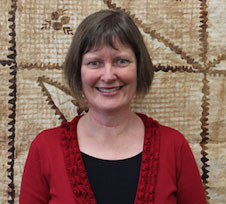 Thursday 2 March 2017 4:32pm
Thursday 2 March 2017 4:32pm
Dr Lianne Parkin
Researchers from University of Otago are among the first recipients of two new grants from PHARMAC and the Health Research Council of New Zealand (HRC).
Dr Lianne Parkin of the Department of Preventive and Social Medicine receives a grant worth more than $210,000 for research into metformin use by people with diabetes. This drug is the first-line treatment for type 2 diabetes, however overseas research shows that many patients don't use it as prescribed.
Dr Parkin and colleagues will explore how to improve the way New Zealanders with type 2 diabetes use metformin.
PHARMAC Chief Executive Steffan Crausaz and HRC Chief Executive Professor Kath McPherson announced the first recipients of the joint fund today.
Mr Crausaz says the two studies will provide valuable insights into how New Zealanders can get the best out of medicines.
“Our objective in setting up the fund with the HRC was to improve our knowledge of medicines use in New Zealand, so that we can take steps to improve people's use of medicines,” he says.
“Metformin is an important medicine for people with type 2 diabetes, so Dr Parkin's research will give us a better idea as to why people might not continue taking the medicine they need to keep them well.”
Dr McPherson says the collaboration with PHARMAC is providing a further opportunity to grow innovative research into pharmaceuticals in New Zealand.
“We're delighted to be involved in this research initiative with PHARMAC. This is a great example of government health organisations collaborating to benefit patients and strengthen the use of research evidence to improve our health system overall.
“I'm confident that the studies funded through this partnership initiative will be of a high quality and add to our knowledge of how New Zealanders use medicines.
Project details:
Improving metformin adherence and persistence in people with type 2 diabetes
$213,229, 24 months
Principal Investigator: Dr Lianne Parkin. The other investigators are Dr Simon Horsburgh (Preventive and Social Medicine), Mr Dave Barson (Preventive and Social Medicine), Associate Professor Katrina Sharples (Mathematics and Statistics, and Medicine), Dr Jimmy Zeng (Preventive and Social Medicine), Dr Lisa Te Morenga (Associate Dean (Māori), Division of Sciences; Edgar Diabetes and Obesity Research Centre; Human Nutrition), Faumuina Associate Professor Fa'afetai Sopoaga (Associate Dean (Pacific), Division of Health Sciences; Preventive and Social Medicine). Five of the researchers are core members of the Pharmacoepidemiology Research Network at the University.
Type 2 diabetes imposes a substantial burden on New Zealanders, particularly Māori and Pacific peoples. Metformin is the first-line medication for the treatment of type 2 diabetes, but overseas research has found that many patients have suboptimal metformin adherence and persistence. Persistence refers to whether a person stays on a therapy, while adherence refers to whether a person takes a medication according to the prescribed schedule. Suboptimal metformin adherence and persistence are important because they are associated with a higher risk of diabetes complications.
The researchers will use routinely collected health data to (a) describe the patterns of metformin adherence and persistence in New Zealanders with type 2 diabetes, and (b) investigate the predictors and consequences of suboptimal adherence and persistence. They will also interview people with type 2 diabetes to get their views on what helps, and hinders, good metformin adherence and persistence. The findings will contribute to improved outcomes for people prescribed metformin.
For more information, contact:
Dr Lianne Parkin
Senior Lecturer
Department of Preventive and Social Medicine
Dunedin School of Medicine
University of Otago
Tel 64 3 479 8425
Email: lianne.parkin@otago.ac.nz
A list of Otago experts available for media comment is available elsewhere on this website.
Electronic addresses (including email accounts, instant messaging services, or telephone accounts) published on this page are for the sole purpose of contact with the individuals concerned, in their capacity as officers, employees or students of the University of Otago, or their respective organisation. Publication of any such electronic address is not to be taken as consent to receive unsolicited commercial electronic messages by the address holder.